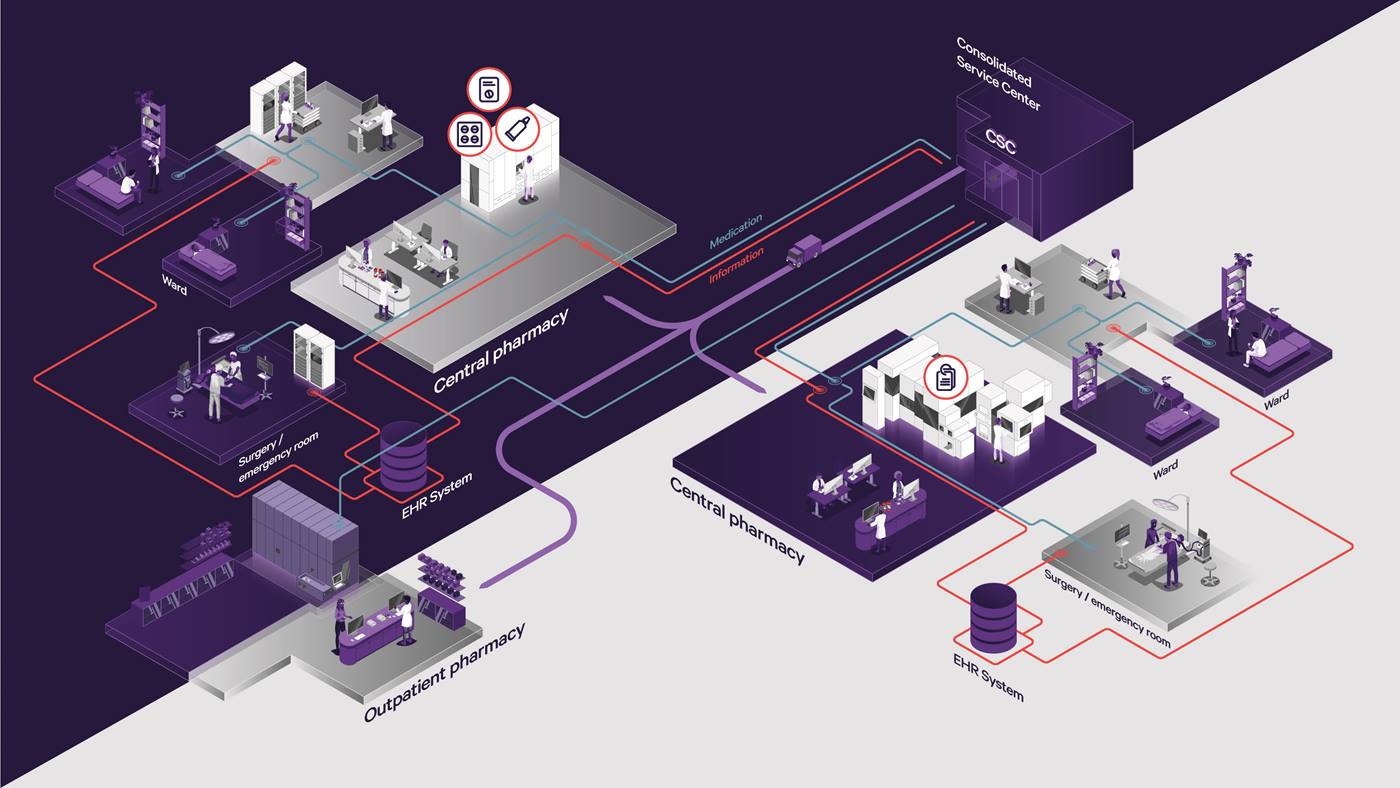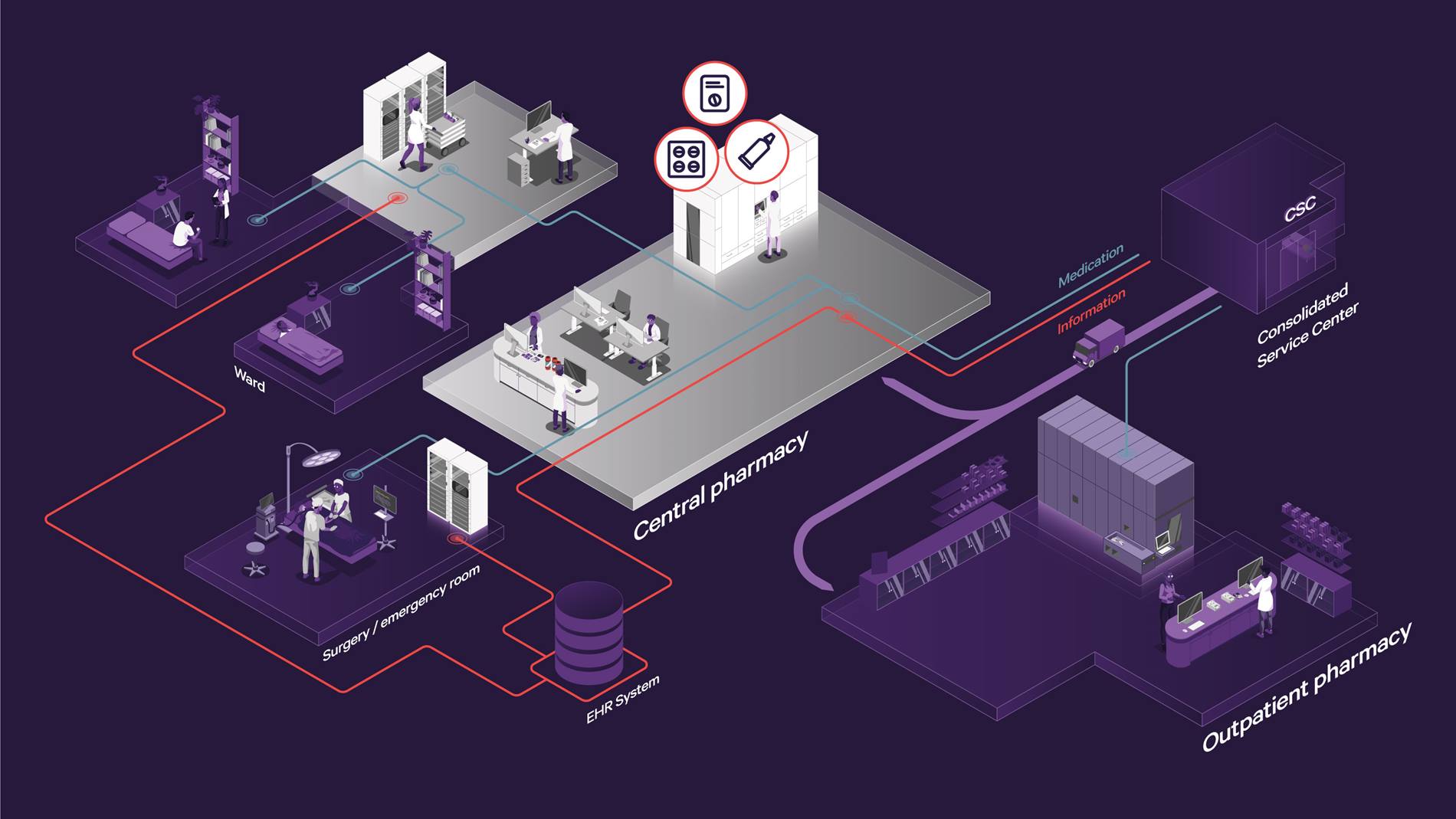Reading Time: 4 min.
The correct and safe handling of medications in hospitals is crucial for appropriate patient treatment and care. Medication errors not only harm patient health but also impact a hospital's reputation. Errors in the medication process are closely tied to medication logistics. From receiving medications to their storage and administration to patients, numerous processes occur. If automation and digitalization play a minimal role, and handwritten entries of therapy data combine with staff shift changes, the potential for errors, especially during medication preparation and administration, increases significantly.
Therefore, adopting a holistic approach that supports specialized staff through automation and digitalization in medication management makes sense. Two distinct approaches to therapy preparation have emerged based on where medications are provided within the hospital: centralized and decentralized.
Both benefit from advanced systems seamlessly integrated into the hospital's IT infrastructure.
Centralized therapy preparation
In the centralized approach, the hospital pharmacy becomes the focal point for therapy preparation. The central pharmacy creates and prepares medication for individual patients, utilizing unit doses.
Advantages of centralized therapy preparation
- Central control and standardization: Centralized storage enables clear stock control and medication standardization.
- Central monitoring: Consumption and requirements are centrally monitored.
- Simplified protocols: Inventory protocols can be centrally and uniformly established.
Centralized approach with PillPick
When the hospital's medication stock falls below a predefined minimum, an automatic order is placed with the wholesaler, restocking the central pharmacy.
The unit-dose system PillPick, utilized in the central pharmacy, automates the separation and storage of medicines.
Following a doctor's prescription and validation by a pharmacist, PillPick assembles individual unit-dose preparations onto a therapy ring, attaching a label containing
- patient information,
- prescription details,
- administration time, and
- a unique barcode.
This patient-specific therapy is then delivered to the respective ward, simplifying and securing the medication assignment process by the nursing staff.
Easy return process
In cases of therapy changes or premature patient discharge, the ring can be easily returned to the central pharmacy. PillPick separates the blister into individual doses using lasers, maintaining the manufacturer's packaging integrity, reducing drug waste, and associated costs.
Decentralized approach
In the decentralized model, nursing staff prepares therapies directly on the respective wards. An automated medication cabinet streamlines the process, facilitating error-free medication retrieval by the nurses.
Advantages of decentralized therapy preparation
- Rapid availability: Close storage ensures swift medication availability for patients.
- Efficiency: Independent administration speeds up daily workflows.
- Adaptability: Easy adjustment to treatment changes or requirements.
- Reduced medication errors: Direct responsibility minimizes the risk of errors.
Decentralized approach with BoxPicker
Monitoring medication stock is also a part of the decentralized approach. When reaching the minimum level, an automatic reorder replenishes the central pharmacy.
The automated pharmacy storage and retrieval system BoxPicker, located centrally, stores various forms of medication and facilitates bulk order processing to restock ward supplies. It is possible to add a unit dose packaging system so that only unit doses are stored in BoxPicker.
BoxPicker is the starting point for processing collective orders to replenish the hospital's ward stocks. The dispensing of medication is documented digitally.
Automated dispensing cabinets support decentralized therapy preparation
Automated dispensing cabinets (ADCs) support decentralized therapy preparation, aiding in guided therapy preparation, digital documentation, and maintaining an up-to-date overview of medication stocks throughout the clinic.
While medications are stored in the hospital pharmacy, therapy preparation occurs decentrally on the wards. In an optimal decentralized approach, automated medication cabinets are utilized during therapy preparation. These ward storages offer several advantages:
- Guided therapy preparation on the screen and with the aid of lights ensures greater patient safety.
- Simple digital documentation.
- Up-to-date overview of medication stocks throughout the entire hospital.
Moreover, the system identifies overstocks and understocks in other wards. This prevents medication shortages, avoids incorrect medication, and reduces costs incurred from unused medications
Choosing the right approach
Determining the optimal approach depends on various factors, including the facility's size, structure, patient care, specialization, logistics, infrastructure, budget, and resources.
Conducting a thorough analysis of the current situation, individual needs, resources, and operational processes is crucial in finding the right medication management solution. Depending on the hospital, a hybrid approach combining both methods might be the most suitable way forward.
About the author Gianluca Gervasi
As Product Manager for Pharmacy Automation solutions, Gianluca defines the requirements for developing automation solutions and supports the market introduction of new products. He focuses primarily on our automated storage and retrieval systems, BoxPicker, EvoTec and MedSMART.







